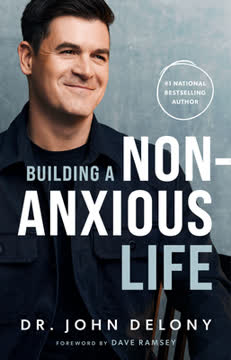Key Takeaways
1. Secrets in relationships erode trust and intimacy
"Intimacy and secrets are like poles of magnets—they repel each other."
Transparency builds trust. Keeping secrets from your partner, whether about past experiences, current activities, or future plans, creates barriers to genuine closeness. While privacy is important, deliberately withholding significant information undermines the foundation of a healthy relationship.
Selective disclosure breeds suspicion. When partners sense that information is being withheld, it often leads to assumptions of wrongdoing or betrayal, even if unfounded. This can spiral into a cycle of mistrust, where both parties become increasingly guarded and less willing to be vulnerable.
Honesty fosters intimacy. Sharing difficult truths, while potentially uncomfortable in the short term, ultimately strengthens the bond between partners. It demonstrates trust, respect, and a commitment to authenticity in the relationship. Open communication about fears, insecurities, and past experiences allows couples to support each other and grow together.
2. Egotism destroys partnerships and family bonds
"Ask not what you can do for this relationship; ask only what this relationship can do for you."
Self-centeredness erodes connection. When individuals prioritize their own needs, desires, and ambitions above those of their partner or family, it creates an imbalance that strains relationships. This "me-first" mentality undermines the mutual support and sacrifice necessary for lasting partnerships.
Cultural shifts exacerbate the problem. Modern society's emphasis on individualism and personal fulfillment has contributed to a decline in commitment to family values and obligations. This trend manifests in:
- Increased divorce rates
- Neglect of children's emotional needs
- Prioritization of career over family time
- Infidelity justified as "self-discovery"
Antidote: Cultivate a "we" mindset. Successful relationships require partners to view themselves as part of a team, working together towards shared goals and mutual happiness. This involves:
- Considering how decisions impact both partners
- Compromising personal desires for the good of the relationship
- Celebrating each other's successes as shared achievements
- Prioritizing family well-being over individual pursuits
3. Pettiness undermines relationship satisfaction and growth
"It's never better to have some stupid secret pop up—it is always better to swallow pride, admit the truth, and work it through together."
Minor irritations become major issues. When partners focus on small annoyances or perceived slights, they risk overlooking the bigger picture of their relationship. This hypersensitivity to minor faults or differences can create a constant state of tension and dissatisfaction.
Communication is key. Many petty conflicts arise from misunderstandings or unspoken expectations. Open, honest dialogue about feelings and needs can prevent small issues from festering into larger problems. Techniques for addressing pettiness include:
- Practicing active listening
- Expressing feelings without blame
- Focusing on solutions rather than complaints
- Choosing battles wisely
Perspective promotes growth. Recognizing that no partner is perfect and that relationships require ongoing effort can help couples navigate petty conflicts. Cultivating gratitude for positive aspects of the relationship and viewing challenges as opportunities for mutual growth can strengthen bonds and increase overall satisfaction.
4. Power struggles damage mutual respect and cooperation
"There is no winner here. He may be exerting his power to put her down so that he can feel up, but it's artificial. His being 'up' is an illusion, and he knows it."
Control issues stem from insecurity. The need to dominate or always be "right" in a relationship often masks underlying fears of vulnerability or inadequacy. This behavior creates an atmosphere of competition rather than cooperation, eroding mutual trust and respect.
Equality fosters harmony. Healthy relationships are built on a foundation of mutual respect and shared decision-making. Partners who view each other as equals are more likely to:
- Compromise effectively
- Support each other's goals
- Communicate openly without fear of judgment
- Work together to solve problems
Breaking the cycle requires self-awareness. Recognizing and addressing one's own tendencies towards controlling behavior is crucial for improving relationship dynamics. This may involve:
- Examining childhood experiences that shaped relationship patterns
- Practicing vulnerability and admitting mistakes
- Developing empathy for your partner's perspective
- Seeking professional help to address deep-seated issues
5. Misaligned priorities lead to neglect and resentment
"A relationship and a spouse is not a bed you just crash onto at the end of the day."
Neglect breeds discontent. When work, hobbies, or other pursuits consistently take precedence over quality time with a partner or family, it sends a message that the relationship is not a top priority. This can lead to feelings of loneliness, resentment, and emotional disconnection.
Balance is crucial. While individual pursuits and personal growth are important, they should not come at the expense of nurturing intimate relationships. Successful couples find ways to:
- Schedule regular quality time together
- Support each other's goals without sacrificing the relationship
- Communicate openly about needs and expectations
- Make joint decisions about how to allocate time and resources
Shared values create alignment. Couples who discuss and agree upon their priorities for career, family, personal growth, and lifestyle are better equipped to navigate challenges and make decisions that benefit both partners. This alignment helps prevent feelings of neglect or resentment from taking root.
6. Pursuing happiness at others' expense breeds discontent
"Sexualizing a relationship before its time (marriage) and being intimate without an ultimate point (marriage) does not bring happiness—although the temporary pleasure is seductive."
Short-term pleasure vs. long-term fulfillment. The pursuit of immediate gratification, whether through casual relationships, infidelity, or prioritizing personal desires over partner's needs, often leads to long-term dissatisfaction and regret. True happiness in relationships stems from mutual growth, shared experiences, and deep emotional connection.
Self-reflection is essential. Understanding one's own motivations, fears, and patterns in relationships is crucial for making healthier choices. This involves:
- Examining past relationship mistakes
- Identifying personal values and life goals
- Recognizing and addressing emotional wounds
- Developing self-esteem independent of relationship status
Practicing empathy and consideration. Sustainable happiness in relationships comes from balancing personal needs with those of your partner. This requires:
- Active listening and validation of partner's feelings
- Willingness to compromise and make sacrifices
- Celebrating partner's successes and supporting their goals
- Working together to create shared dreams and aspirations
7. Excuses prevent accountability and problem-solving
"Maturity is partially defined by the willingness to be held accountable, without excuse, for your actions."
Responsibility fosters growth. Making excuses for poor behavior or relationship problems prevents individuals from addressing the root causes of issues. By accepting responsibility for one's actions and their impact on the relationship, partners create opportunities for genuine change and improvement.
Honesty builds trust. When individuals take ownership of their mistakes and shortcomings, it demonstrates integrity and a commitment to the relationship. This openness creates an atmosphere where both partners feel safe to be vulnerable and work together on solutions.
Breaking the excuse habit. Overcoming the tendency to make excuses requires conscious effort:
- Pause before responding defensively
- Acknowledge impact of actions on partner
- Focus on finding solutions rather than assigning blame
- Practice self-compassion while taking responsibility
- Seek professional help if patterns persist
8. Harmful liaisons threaten relationship stability
"Even to attempt to rationalize away behaviors that cause your spouse pain, is to virtually spit on him or her."
Boundaries protect intimacy. Engaging in inappropriate relationships or activities outside the primary partnership, even if not physically intimate, can erode trust and emotional connection. This includes:
- Excessive flirting or seeking attention from others
- Maintaining close friendships with exes
- Sharing intimate details of the relationship with others
- Engaging in online or emotional affairs
Respect fosters security. Partners who prioritize each other's feelings and maintain clear boundaries with others create a sense of safety and loyalty in the relationship. This involves:
- Discussing and agreeing on appropriate behavior with others
- Being transparent about interactions with potential threats
- Prioritizing the primary relationship over outside attention
- Addressing issues of jealousy or insecurity openly
Repairing trust takes time. If harmful liaisons have occurred, rebuilding the relationship requires:
- Complete honesty about the extent of the betrayal
- Cutting off contact with the third party
- Demonstrating consistent, trustworthy behavior over time
- Seeking professional help to address underlying issues
- Patience and forgiveness from both partners
9. Mismatched partners face ongoing compatibility struggles
"A fish and a bird can fall in love, but where will they live?"
Fundamental differences create friction. While some differences can be complementary, core incompatibilities in values, goals, or lifestyles often lead to ongoing conflict and dissatisfaction. Common areas of mismatch include:
- Religious or spiritual beliefs
- Attitudes towards money and financial goals
- Desires for children and parenting styles
- Career ambitions and work-life balance
- Communication styles and conflict resolution approaches
Early recognition is crucial. Identifying potential mismatches early in a relationship allows individuals to make informed decisions about long-term compatibility. This involves:
- Having honest conversations about values and life goals
- Observing how potential partners handle stress and conflict
- Paying attention to red flags or incompatibilities
- Considering whether differences are negotiable or deal-breakers
Growth requires mutual effort. Some mismatches can be overcome with dedication and compromise from both partners. Successful navigation of differences involves:
- Open communication about needs and concerns
- Willingness to learn and adapt to each other's perspectives
- Finding creative solutions that honor both partners' values
- Seeking professional help to mediate significant conflicts
- Recognizing when differences are truly irreconcilable
Last updated:
FAQ
What's Ten Stupid Things Couples Do to Mess Up Their Relationships about?
- Focus on Mistakes: The book by Dr. Laura Schlessinger identifies ten common behaviors that can undermine relationships.
- Behavior Analysis: Each chapter explores a specific "stupid" behavior, such as withholding secrets and egotism, explaining how these actions damage intimacy and trust.
- Practical Solutions: Dr. Schlessinger offers strategies for couples to recognize and change these behaviors to foster healthier relationships.
Why should I read Ten Stupid Things Couples Do to Mess Up Their Relationships?
- Improve Dynamics: The book provides insights into common pitfalls, helping readers avoid these mistakes in their relationships.
- Real-Life Examples: Dr. Schlessinger uses examples from her radio show to illustrate the consequences of these behaviors, making the advice relatable.
- Strengthen Bonds: Addressing these issues can help couples build stronger, more fulfilling relationships, leading to greater happiness.
What are the key takeaways of Ten Stupid Things Couples Do to Mess Up Their Relationships?
- Awareness of Behaviors: Recognizing behaviors like egotism and power struggles is crucial for avoiding relationship damage.
- Communication Importance: Open and honest communication is vital for resolving conflicts and misunderstandings.
- Commitment to Change: Couples are encouraged to commit to personal growth and mutual respect for a healthy partnership.
What are the best quotes from Ten Stupid Things Couples Do to Mess Up Their Relationships and what do they mean?
- “Human beings have needs…”: This quote emphasizes recognizing and addressing deeper emotional needs in a relationship.
- “You can choose to be the master.”: Highlights the power individuals have to control their actions and choices.
- “It’s not much skin off your nose.”: Suggests letting go of minor irritations for the sake of harmony in a relationship.
What are the ten stupid things couples do according to Dr. Laura Schlessinger?
- Stupid Secrets: Withholding important information can lead to distrust and resentment.
- Stupid Egotism: Prioritizing personal desires over relationship needs creates imbalance.
- Stupid Pettiness: Focusing on trivial issues can escalate conflicts and harm the relationship.
- Stupid Power: Engaging in power struggles undermines partnership and intimacy.
How does Dr. Laura Schlessinger define "Stupid Power" in the book?
- Control Over Others: "Stupid Power" refers to the need to dominate or control a partner, leading to resentment.
- Destructive Behavior: This behavior can manifest as criticism, manipulation, or emotional abuse.
- Lack of Intimacy: Power struggles make it difficult to connect emotionally, breaking down trust and affection.
What is the significance of communication in Ten Stupid Things Couples Do to Mess Up Their Relationships?
- Foundation of Trust: Effective communication is essential for building and maintaining trust.
- Conflict Resolution: Open dialogue allows couples to address misunderstandings before they escalate.
- Emotional Connection: Sharing thoughts and feelings fosters intimacy and strengthens bonds.
How can couples avoid the "Stupid Priorities" trap?
- Set Relationship Goals: Couples should prioritize their relationship by setting mutual goals.
- Balance Commitments: Balance work, family, and personal interests to keep the relationship a focal point.
- Regular Check-Ins: Schedule discussions about each other’s needs to maintain connection.
What role does self-awareness play in improving relationships according to Dr. Laura Schlessinger?
- Recognizing Flaws: Self-awareness helps individuals identify harmful behaviors.
- Taking Responsibility: Understanding one’s actions fosters accountability and encourages growth.
- Enhancing Empathy: Awareness of one’s feelings can lead to greater empathy towards a partner.
How does Ten Stupid Things Couples Do to Mess Up Their Relationships address the issue of jealousy?
- Understanding Insecurities: Jealousy often stems from personal insecurities and fears.
- Open Communication: Discuss feelings of jealousy openly to address underlying issues.
- Healthy Boundaries: Establish boundaries regarding interactions with others to promote security.
How does Ten Stupid Things Couples Do to Mess Up Their Relationships address communication issues?
- Encourages Open Dialogue: Emphasizes discussing feelings and concerns openly to prevent misunderstandings.
- Identifies Pitfalls: Outlines common communication failures that lead to conflict.
- Promotes Active Listening: Encourages active listening to foster understanding and empathy.
What advice does Dr. Laura give for couples dealing with in-law issues?
- Establish Clear Boundaries: Communicate boundaries regarding family involvement to prevent conflicts.
- Support Each Other: Partners should support one another when dealing with family issues.
- Prioritize Your Marriage: Remember that the marriage comes first, helping navigate family dynamics effectively.
Review Summary
Ten stupid things couples do to mess up their relationships receives mixed reviews. Some praise Dr. Laura's straightforward advice and traditional values, while others criticize her harsh tone and outdated views. Readers appreciate her focus on personal responsibility and relationship insights, but many find her writing repetitive and overly opinionated. The book's religious content and anti-feminist stance are contentious points. Overall, reviewers acknowledge some valuable relationship advice, but the delivery and certain perspectives are polarizing.
Similar Books







Download PDF
Download EPUB
.epub digital book format is ideal for reading ebooks on phones, tablets, and e-readers.






